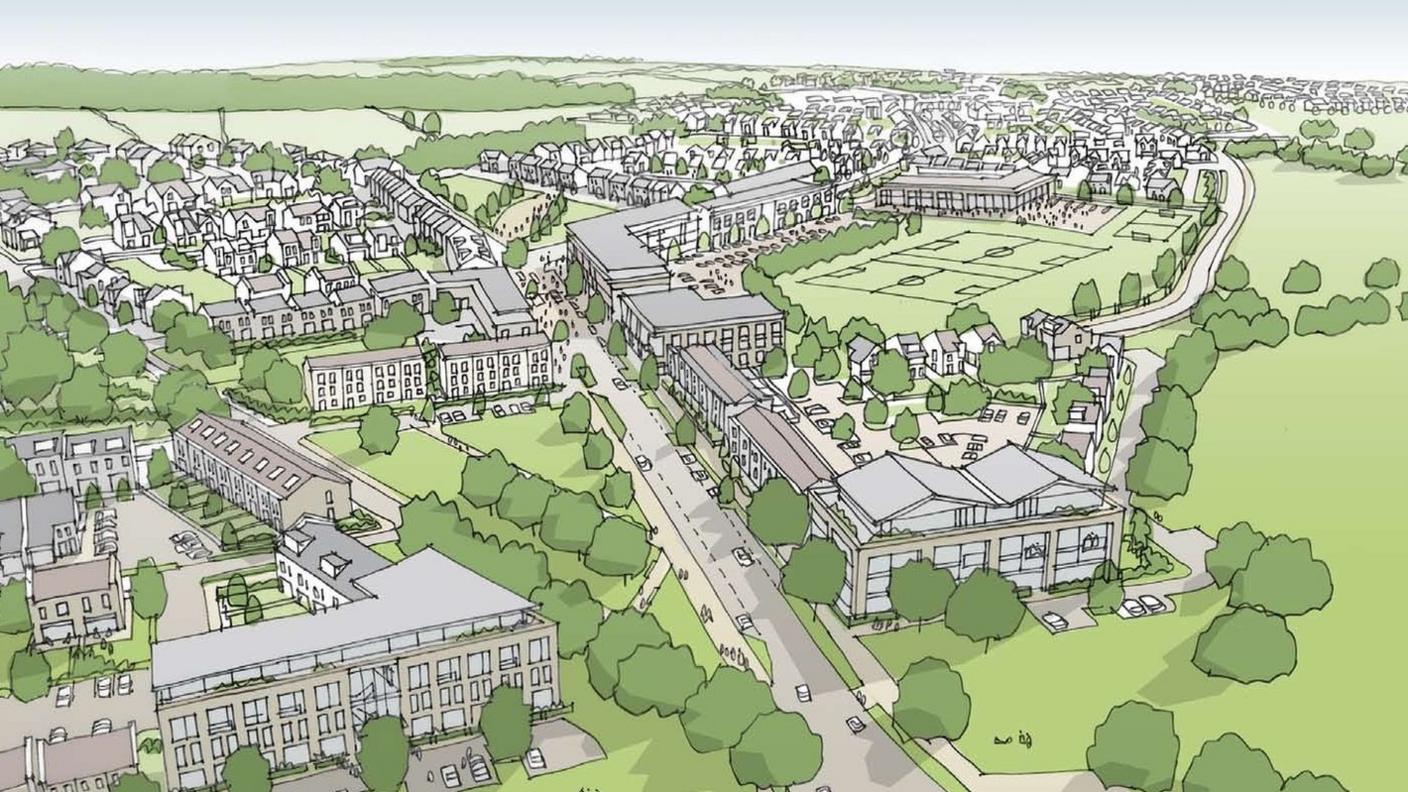Graven Hill: Inside the UK's biggest self-build development
- Published

Building began at Graven Hill in 2016 and is expected to continue until 2032
"The life you've always dreamed of. The home you've always wanted... Self-build is for everyone."
That is the promise from the masterminds behind the UK's largest self-build community which began almost a decade ago, but does the dream match the reality at Graven Hill?
There is nowhere in the UK quite like it - a place where houses in a huge variety of shapes, sizes, colours and styles line the streets.
This apparent idyll, just outside Bicester in Oxfordshire, has slowly taken shape ever since Cherwell District Council bought a former Ministry of Defence site in 2014.
Inspired by Almere in Holland, where self-building appears to have challenged the status quo, external, a bold masterplan was unveiled to build 1,900 homes with a difference, resulting in waves of originality and creativity.
Graven Hill is a constant work in progress - skips and construction vehicles are ubiquitous, and drills and hammers echo around the development.
But not everything is going to plan. Work has finally begun on a school but a community centre is overdue, and a promised pub is nowhere to be seen.
Meanwhile, some residents are worried that the wholesome objectives at the start of the project are being watered down as the practicalities of achieving its ambitious aims are tested.
Pioneers
When self-build works the advantages are clear; it is a chance to build an energy-efficient dream home on an affordable budget.
Karen Curtin, the managing director of Graven Hill Village Development Company Ltd (GHVDC), says: "I don't think it's ever going to be replicated in the UK on such a scale."
The rest of Graven Hill is made up of custom-builds, new builds, affordable housing and apartments - with the first phase of individual plots released in 2016.
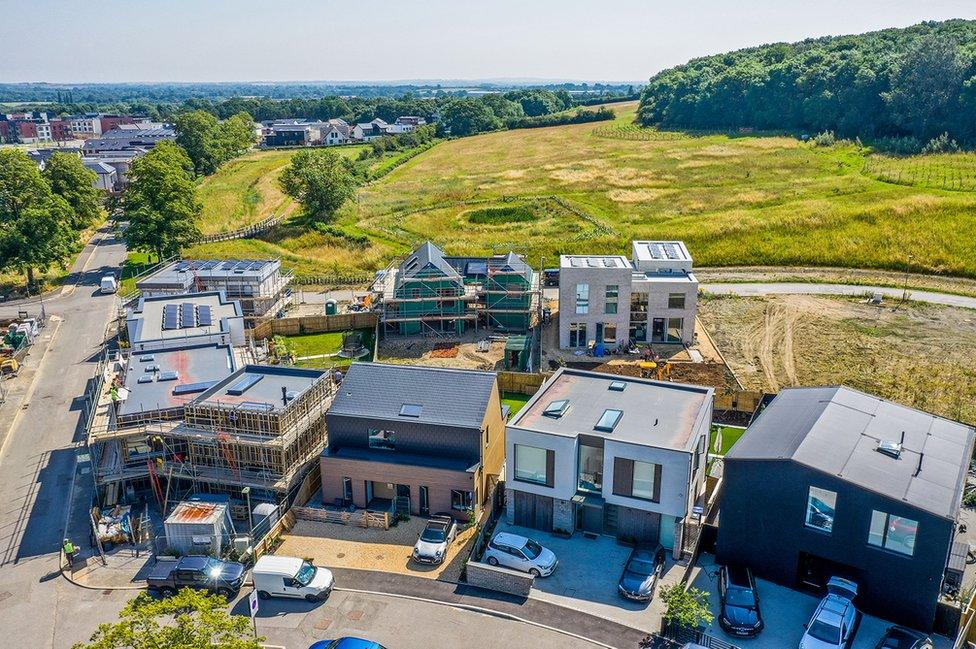
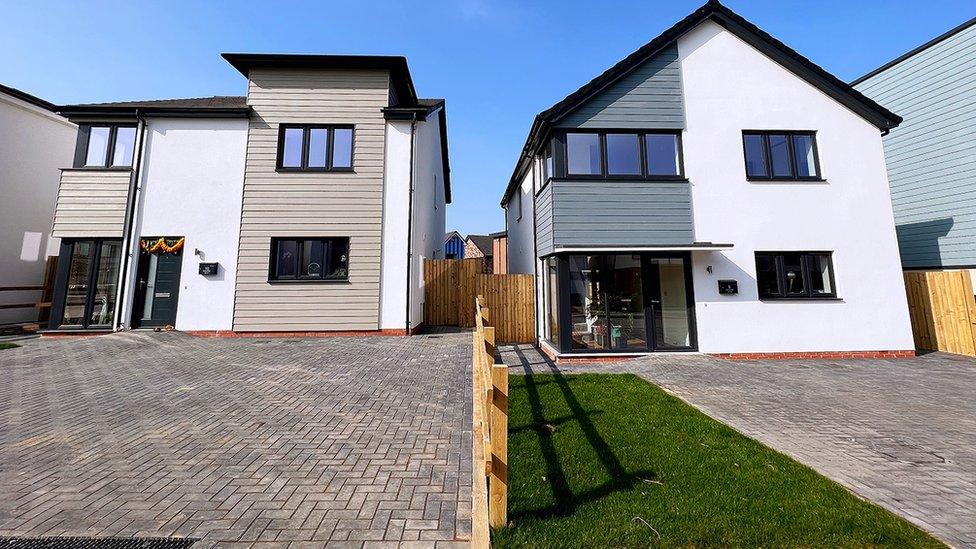
The estate is built on a former Ministry of Defence site outside Bicester, Oxfordshire
Paul Troop was the first self-builder to start construction. He is part of the group of "phase zero pioneers", whose stories were featured on Channel 4's Grand Designs: The Street, external.
He says: "The most striking thing is the massive community here... it's unlike anywhere I've ever lived.
"Everyone knows each other, everyone helps each other."
Jules and Emma Faraday moved from a terraced house in East Dulwich, south-east London, in May.
Computer programmer Mr Faraday explains: "I grew up in Shropshire where I had a lot of freedom and I wanted that for the boys.
"One of the things I noticed when we first moved up here is when you walk around everybody looks up and says, 'Hello', and I think the reason for that is people realise it's a community."
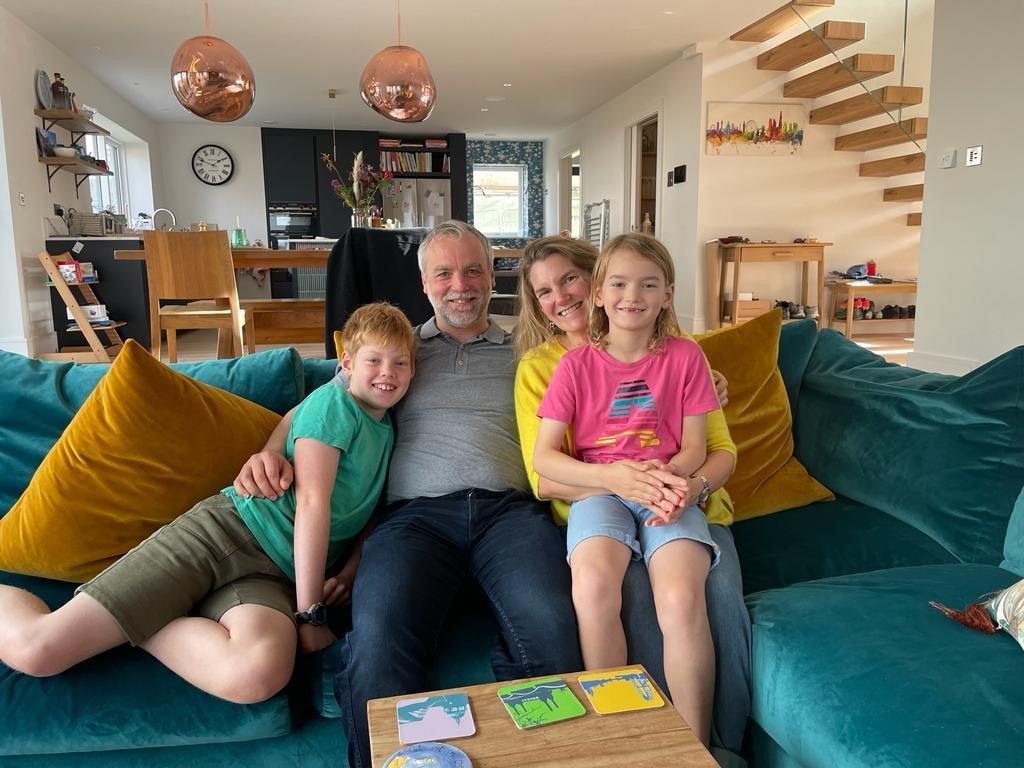
Jules and Emma moved from a terraced house in East Dulwich with boys Dexter and Aden
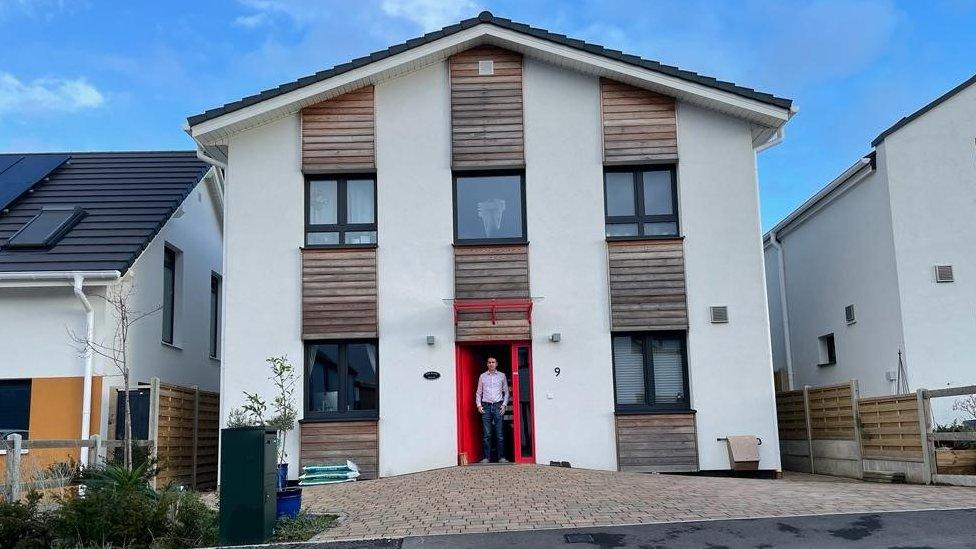
Stephen was renting in Richmond but now lives in a Dan-Wood home in Graven Hill
Retirees Darren and Christine Adams won a Build It award, external for their brick house, which is three times the size of their three-bedroom terrace in Nottingham.
"We got to know all of our neighbours and people in the surrounding houses just through watching them build, and chatting," Mrs Adams says.
"People ask for a little bit of help or knowledge, or ask to borrow a wheelbarrow or offer spare insulation."
Software engineer Stephen Aggett says: "The street view's constantly changing."
Mr Aggett, who is also chair of the Graven Hill Residents' Association, was renting in Richmond but now lives in a Dan-Wood home, external with his wife and son.
"The best thing about Graven Hill is the community," he adds. "I've made so many friends here - friends for life."
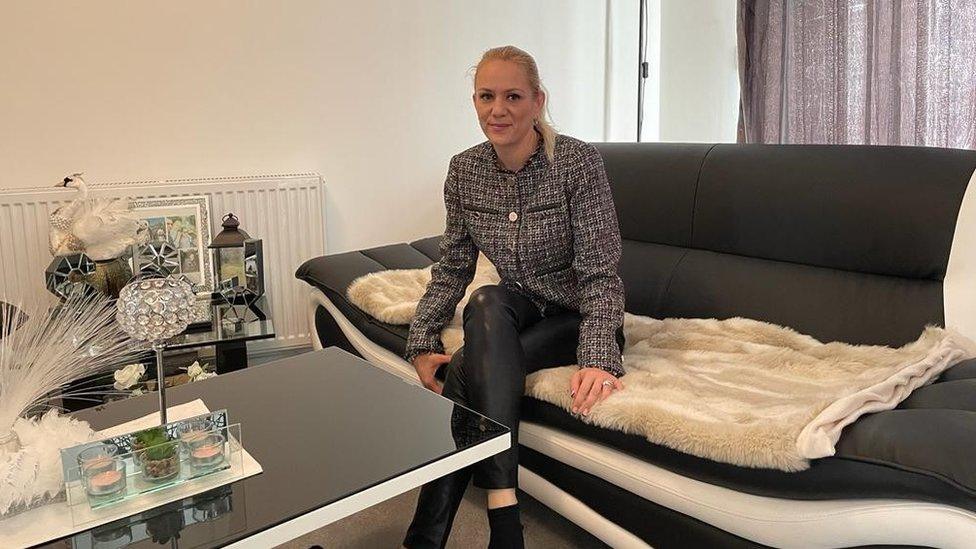
Silvana lives in a new build on the estate but has aspirations to self build nearby
Silvana Milenkovska runs a domestic and commercial cleaning service and is originally from Macedonia.
She now lives in a three-bedroom new build with her husband and two children, and speaks of the "peace of mind" she gets from life in Graven Hill.
"Everyone is friendly - we have lovely people from different cultures, you feel very welcome," she says.
Mrs Milenkovska previously lived in Bicester and was inspired to move to Graven Hill after she was contracted to clean a large self-build property on the estate.
"At that moment I said, 'Maybe here I can start my dreams'," she recalls.
"We wanted to start with this but self-build is our next step in the future."
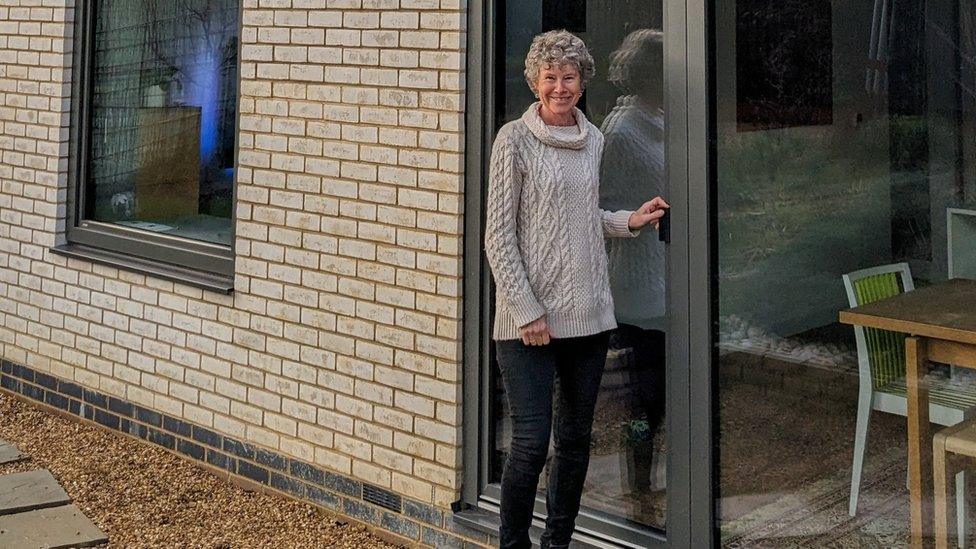
Christine Adams won a Build It award for her self built brick house
Despite Graven Hill's slogan, Ms Curtin admits: "You'd like to say self-build is for everyone but it isn't, is it?
"Let's face it, you've got to be very focussed on delivery, managing within a budget and have project management skills.
"But you've also got to have vision and perseverance because self-build isn't easy.
"We do try and make it easier at Graven Hill because we've obviously got the land, the planning process that can take 28 days, and we give you a service plot."
Passion project
Mrs Adams explains: "We were very careful with our budget when we were building and we did so much of it ourselves.
"We had to have a bricklayer and a professional electrician but absolutely anything we could do ourselves, we did."
General practice nurse Mrs Faraday adds: "It takes a certain person just to think, 'Let's build our own house'.
"A degree of confidence or craziness are common traits."
Graven Hill is gradually being completed in sections, with each self-builder given two years to complete their passion project.
The rest of the site is taking shape too and work began on a 420-pupil primary school last year.
But other amenities have yet to materialise, including shops, a pub, a combined community and sports centre, extra-care facility, nursery, dental practice, pharmacy, restaurant, hotel, playing fields and a large surgery - which could eventually replace the smaller surgeries in Bicester.
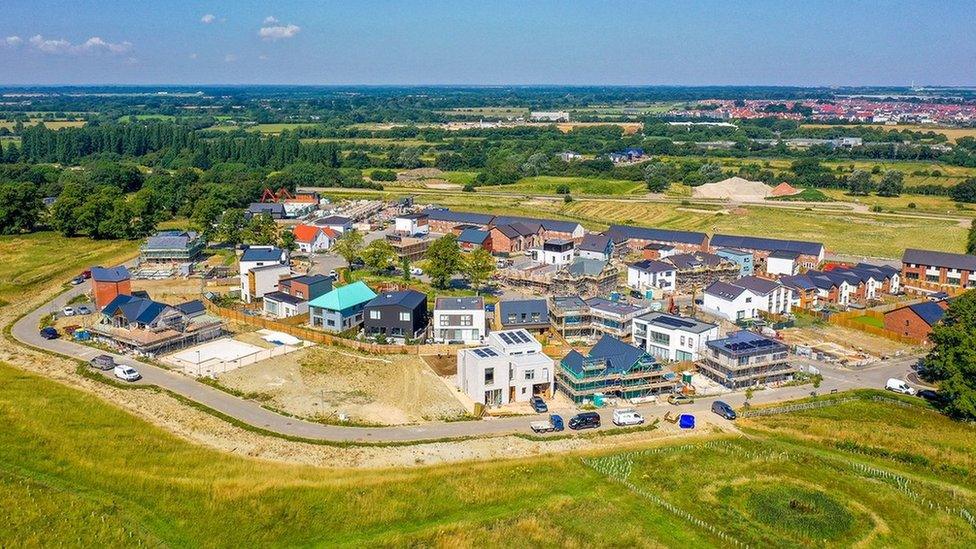
There are plans for a nursery, dental practice, pharmacy, restaurant and hotel, playing fields, and large surgery
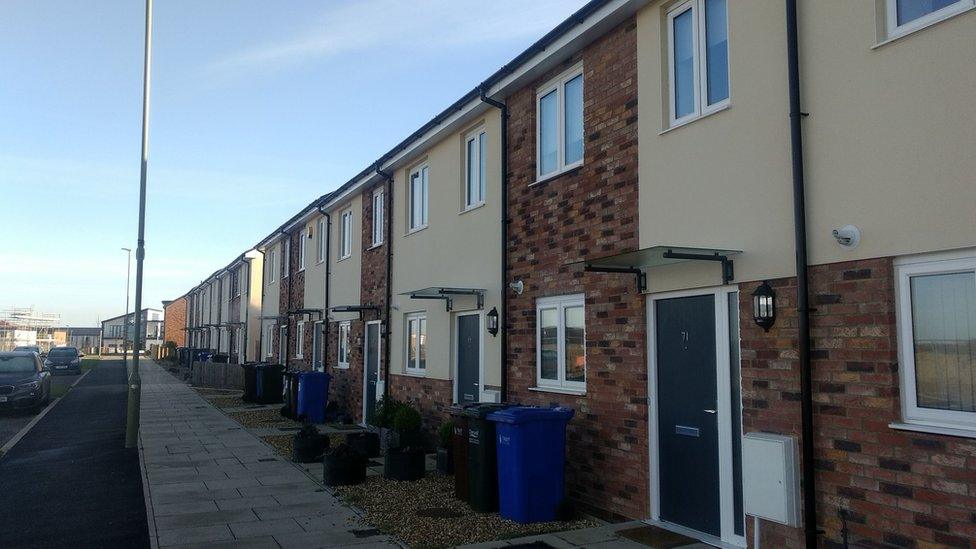
Some new build owners on site have reported issues with missing insulation
"Shops on Graven Hill would be nice... where you can buy milk, bread and a newspaper," Mrs Faraday says.
"What we want are things like a community centre so we've got somewhere to meet, and a pub would be nice but I'm not sure that will ever happen. But that's how it was sold."
Mr Aggett says: "Our fear is they'll give up the pub site and just build houses on it instead.
"Then, when there are eventually enough people here to provide more commercial interest for a pub, they won't be able to site it anywhere near the centre."
'Key asset'
GHVDC says "whilst not a planning obligation" it recognises a potential pub as an "important part of creating a community".
It has agreed to promote the land to potential operators, via commercial property consultants White Commercial, for a further two years.
But some residents are still worried about other parts of GHVDC's new outline consultation, external, citing reduced green spaces and increased housing density.
But the company says there are "no fundamental changes" and adds matters regarding "appearance, means of access, landscaping, layout and scale" will be subject to further consultation.
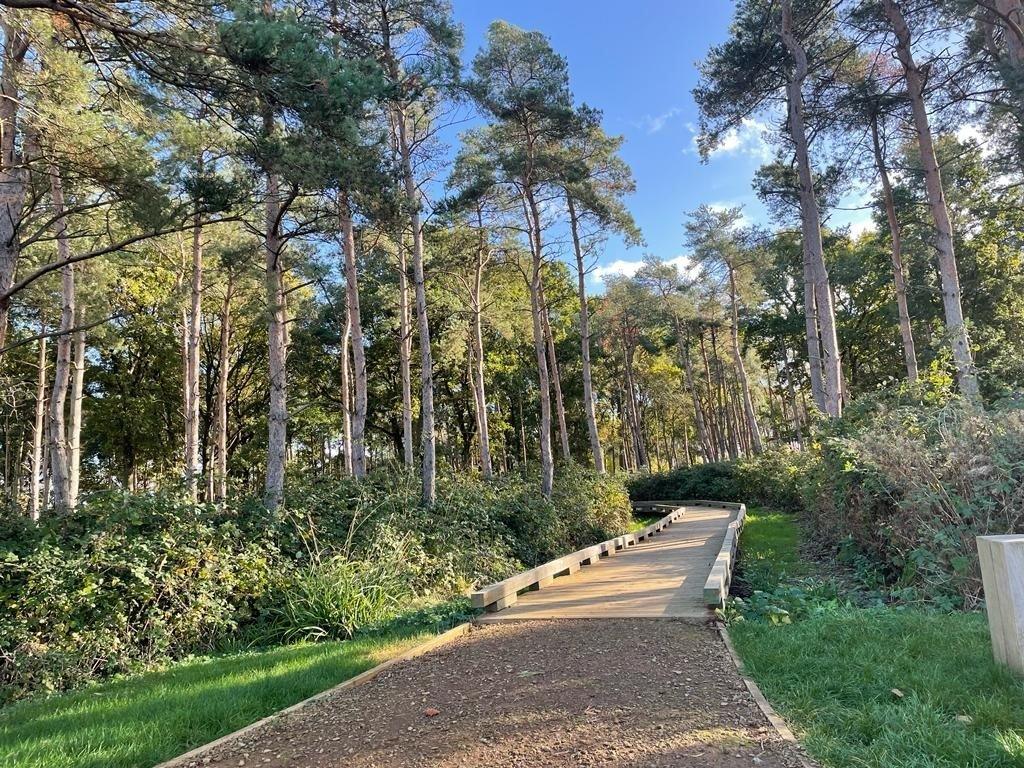
Graven Hill is popular with residents who love the Great Outdoors
Mr Aggett says he is dismayed by what he sees as an increased emphasis on new builds as opposed to self-builds.
"I've spoken to many wannabe self-builders in Bicester who are looking out for a plot but there aren't the cheaper plots coming up anymore, so there's demand there but tighter supply."
He adds: "Instead of becoming a development that's the envy of Bicester and Oxfordshire it becomes a development that's not quite as attractive or well-kept as the privately-developed places."
GHVDC says while the "initial ethos" was a focus on self-build plots, market demand has changed in ways not envisaged in the project's early days.
It says Brexit, Covid and economic pressures have all contributed to "delivery challenges".
It estimates that by the end of March the site will consist of 26% self-build plots, 30% custom homes, 26% apartments and 18% affordable homes.
Barry Wood, leader of the district council - which continues to set the overall vision for the development, said he was "really proud of the progress".
'Big disparity'
He said the delivery model had "evolved" over time, but there was a "mix of opportunities that are responsive to market demand".
Mr Aggett is also critical of the quality and design of the new builds, especially as the company holds self-builders "to such high standards of building ecologically-friendly houses".
He adds: "Graven Hill aren't building houses with an equivalent quality themselves, so there's a big disparity."
In his role on the residents' association he says he has been approached by people experiencing issues with the new builds, including missing insulation and mechanical ventilation systems not working properly.
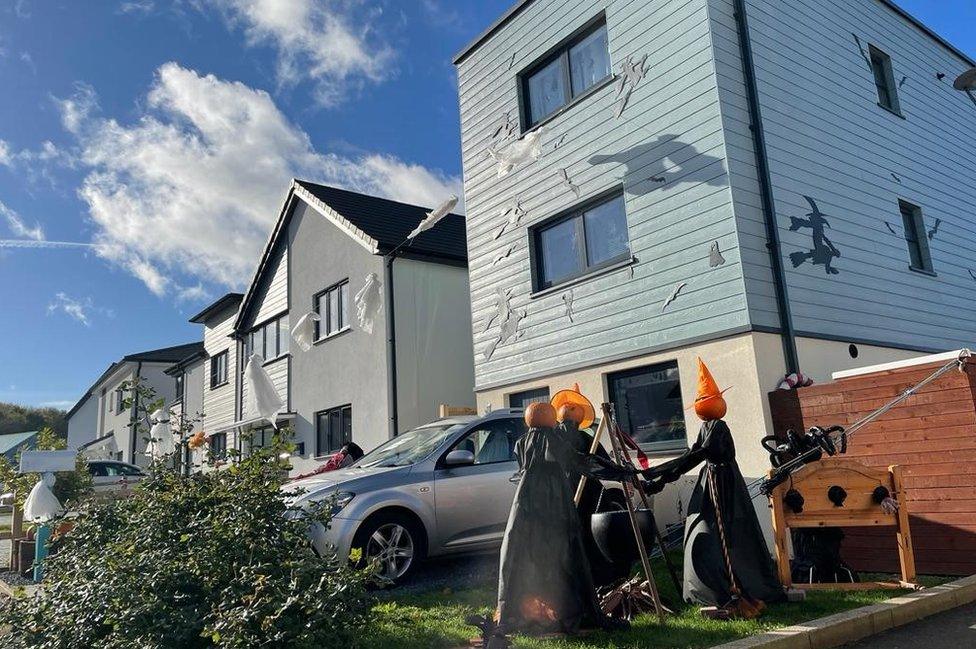
Residents across Graven Hill speak positively about the strength of its community

The phase zero pioneers (the blue houses, top left, next to the show homes) are yet to be connected to the main site
Mr Troop calls the situation "problematic", suggesting it contributes to a social divide on site, with community events mainly attracting the self-builders and custom-builders.
"That's entirely unnecessary," he points out, adding: "Everyone is entitled to a decently-designed and built house that's economical to run, at least on a project delivered by a local council.
"It really wouldn't cost much more to employ an architect to design units that look really attractive, blend in."
Mr Troop, who works as a lawyer and moved from Jericho in Oxford with his wife, also agrees the plots have become too expensive, leading to the latest wave of self-builders being much more affluent.
"We got in early so we were lucky when plot prices were cheap and it was quite reasonable to do it," he says.
"It would be very difficult for someone local or a young family, like we were, to self-build quite easily."
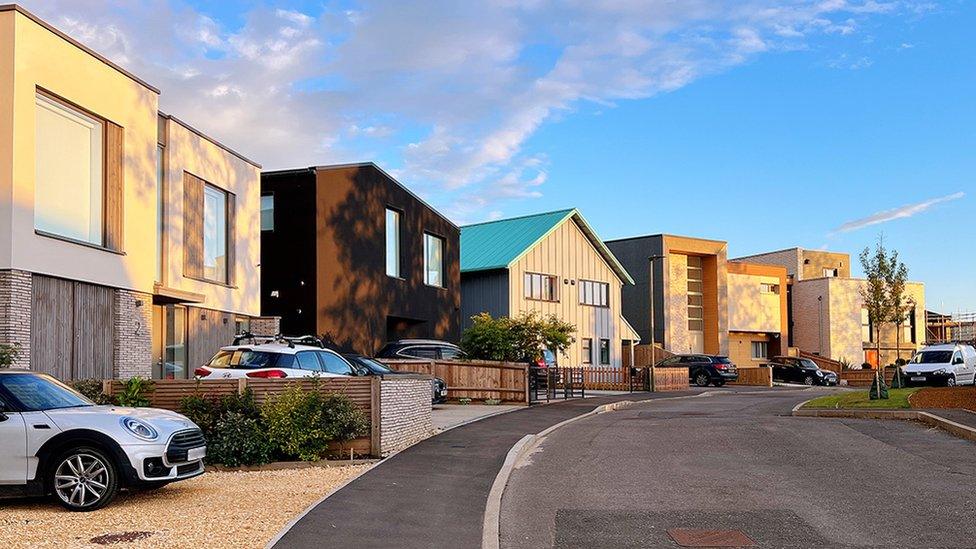
Self-build houses across the site come in varieties of shape, size, colour, and style
The company describes the project with Mr Troop and the other phase-zero pioneers as a "marketing initiative", where "generous incentives" were given that reflected the "experiment, location of the plots, lack of connectivity to the main site, and its close proximity to the rail track and sewage works".
It says it has not had any issues with survey valuations or the mortgage process "and that indicates the values are set correctly".
"If GHVDC were to subsidise land prices, which we are not allowed to do, then it would only devalue its own development and that of the home buyers," it adds.
Regarding the criticism of some of the new builds it adds: "Design is subjective and not everyone will share the same views on visual designs, materials and/or colour.
"Like any developer, we do on occasion, have some snagging issues but overall the quality of the homes is of a very high standard which is reflected in our customer satisfaction feedback."
It says it is working with eight different designers and still believes Graven Hill is a "very different type of housing development that offers more choice for the homeowner".
Mr Wood said he was "confident that any issues will be resolved in a timely fashion by the Graven Hill team continuing to work closely with residents".
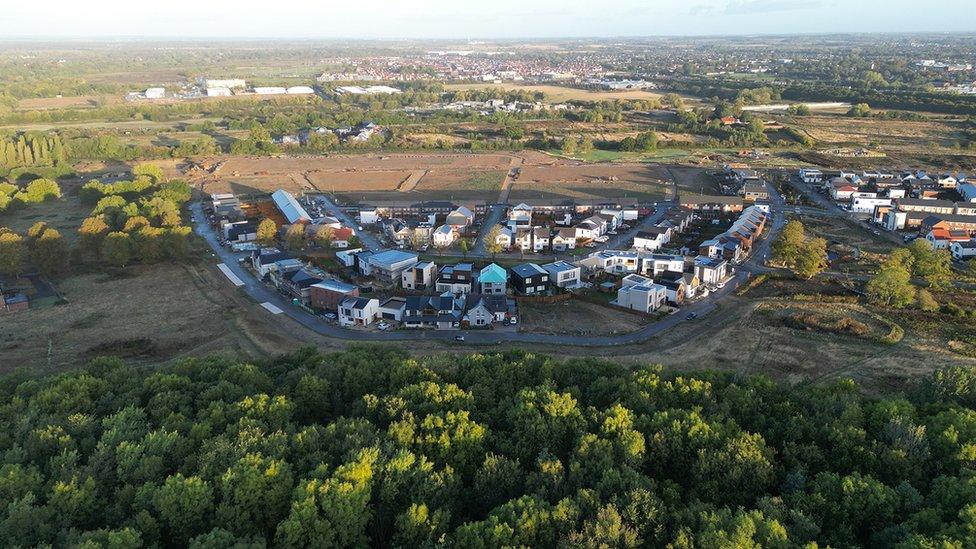
Managing director Karen Curtin says the self-build market will spread in the UK because of Graven Hill
Despite having some reservations about the direction Graven Hill is going, Mr Aggett admits he is here to stay.
"Research shows people who self-build houses are far, far less likely to sell up, and it's absolutely true," he explains.
"Every inch of this house is just the way we want it and there because it suits us."
Mrs Adams is not so sure. She says: "We didn't think about necessarily staying here forever."
She adds: "It's lovely but we don't need all this space, so in the next three years we'll move somewhere smaller, whether that's around here or somewhere else, I don't know."
Legacy
As for trailblazer Mr Troop - Graven Hill's first housebuilder - he can see himself moving out if the company does not deliver on its promises.
"We moved here on the belief it was going to be one thing," he says, adding: "Whether it's going to turn out like that we'll see.
"It could be diverse, quality housing for everybody, accessible to a wide range of people - not just the very rich - with really good community facilities, connected to a thriving market town."
He adds: "Someone really needs to get cracking and sort out the things that are going wrong."
Graven Hill is currently expected to be completed in 2032. Last year it delivered its 456th home.
Ms Curtin says: "We will have a development that has showcased the benefits of self and custom-build to the UK market, and its legacy is, it's not just in Bicester, it is replicated."
"Maybe not on this scale but up and down the UK, in a number of other developments, there will be a good proportion of real customer choice.
"So that's what I'd like the legacy to be - that Graven Hill led to a change in how housing developments are delivered in the future."

Follow BBC South on Facebook, external, Twitter, external, or Instagram, external. Send your story ideas to south.newsonline@bbc.co.uk, external.
Related topics
- Published22 June 2022
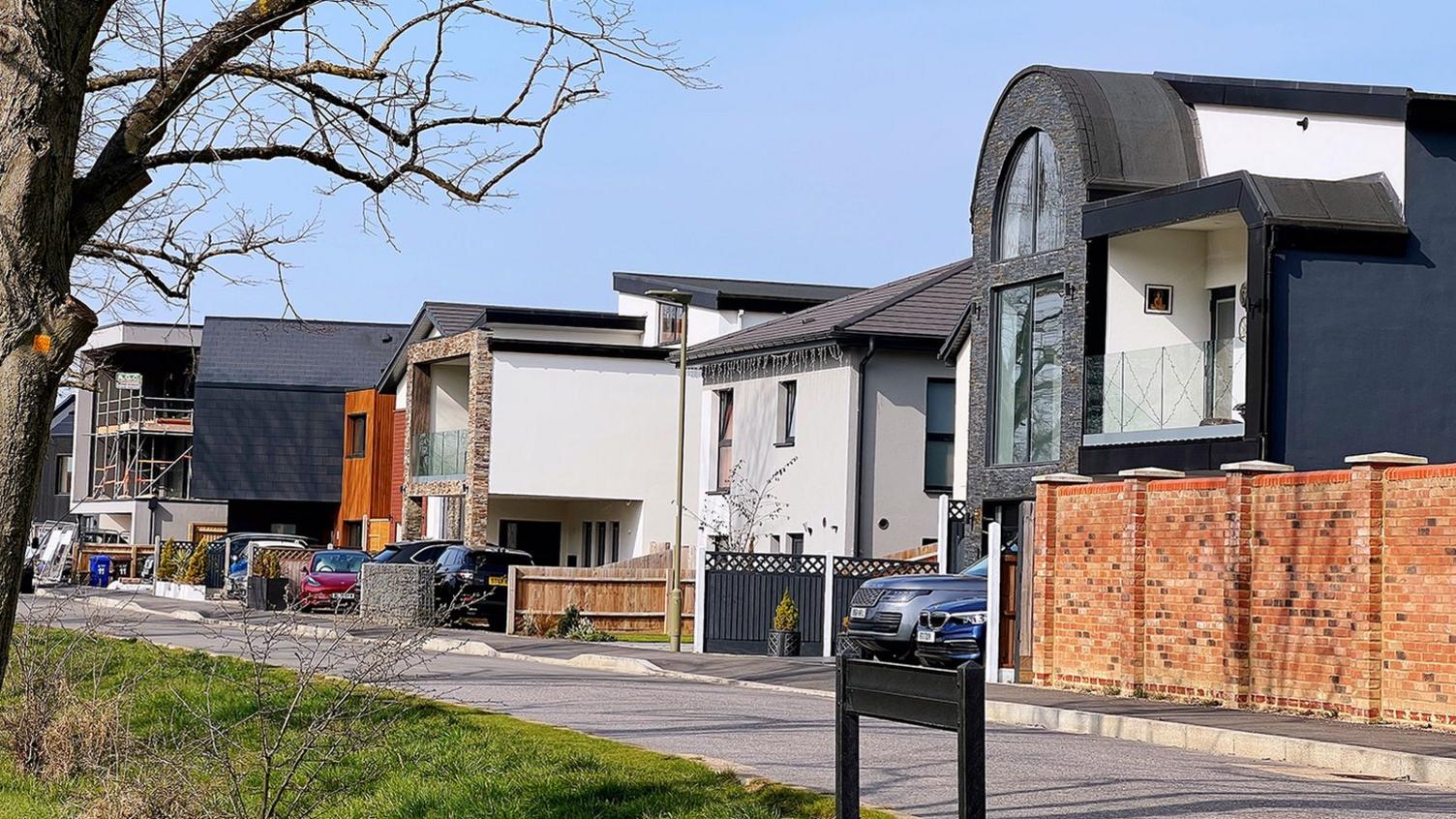
- Published21 August 2014
